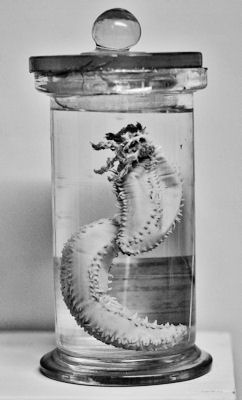(after Sei Shonagon)
 A river in winter with ice floes jammed violently against one another; you can see dark water in between the white and gray floes, sparkling in the sunshine.
A river in winter with ice floes jammed violently against one another; you can see dark water in between the white and gray floes, sparkling in the sunshine.
Abandoned barns, their huge roofs sagging like the backs of tired horses.
The slick, black body of a baby goat, stillborn, lying in the hay between its confused mother’s hooves.
Neat little white-topped piles of green chicken shit–food for fragrant pink phlox and Brussels sprouts.
A limp newly hatched baby bird that has fallen onto the grass from a nest in the pine tree and has died with part of its bright blue eggshell still attached to its damp feathers.
The angry red fists of rhubarb when they first appear in the dark soil of the spring garden.
An egg, fresh from your own hen, that, when cracked open into a bowl as part of your breakfast preparations, contains a spot of dark red blood, the beginnings of a new life.
A piece of pine log split open with an ax and full of black ants scurrying madly about, carrying their white eggs, shaped like grains of rice, out of harm’s way.
A perfect tiny gray field mouse dead in the bottom of the grain can.
A perfect tiny gray field mouse caught in a trap inside your pantry, its ears and tail pink and soft, its eyes round and dark like peppercorns.
A perfect tiny gray field mouse that has been interrupted on her nest in the woodpile with her hairless babies; she carries them, as you watch, one by one, in her mouth, out of harm’s way.
The green and blue and red guts of a chicken as you pull them out, like steaming ribbons, on a fall afternoon when you are processing your flock.
The way a great rainstorm washes out your dirt driveway and leaves a beautiful fan of sand on the paved county road below.
Lightning and thunderclouds on the horizon.
A river in springtime that has overflowed its banks, sending muddy water up into the forest.
The vegetable garden after the first hard frost of fall when all the leaves have turned dark green and wilted.
Swollen, fat green caterpillars hiding among cabbage leaves.
White moths flittering about, laying eggs that will hatch into green caterpillars.
A pig-like grey squirrel hanging from the bird feeder, its full gray tail curled up along its back.
The brittle white gills on the underside of a poisonous mushroom whose bright red top attracts your eye in the woods.
A pound of red goat burger thawing on the cutting board in the kitchen; it makes you remember the nimble, sweet-faced two-year-old you had named Felix, whom you had butchered. He was your favorite goat and would lean against you when you walked in the pasture repairing the fence.
—
Gretchen Legler is a professor of creative writing and literature at the University of Maine Farmington. Her works of nonfiction include All the Powerful Invisible Things (Seal Press, 1995) and On the Ice (Milkweed Editions, 2005). Her work has also appeared in venues such as Orion and the Georgia Review. She lives on 80 acres of old farmland where she and her partner garden, keep a flock of chickens, and rustle a small herd of goats.
Photo by Dinty W. Moore

4 comments
BAM says:
Sep 1, 2016
“The angry red fists of rhubarb when they first appear in the dark soil of the spring garden.” Great line!
Charlie says:
Apr 21, 2017
This is an amazing piece. I am just wondering what tempts you to make the title so telling. I do admire this though.
Hailey Esquibel says:
Apr 16, 2018
this is great!
Lisa says:
Apr 9, 2019
This is a great essay . . . though, for me, what is MORE beautiful than eating Felix was when he leaned against you when you walked in the pasture repairing the fence. But then that’s not the “literary” but the literal. Where is the point of decision–what does it take–to butcher your “favorite” animal. I don’t know how that happens. The jump from one (goat in field) to the next (goat defrosting) is material for the writer, but what of the actual event of butchering him. I wonder about that when we write about the deaths/killings of animals.